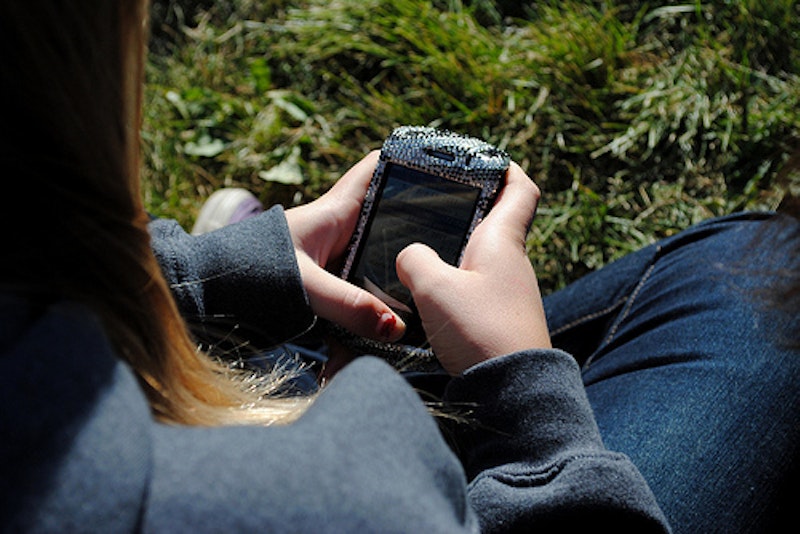“I don’t read”: teenagers and young adults frequently issue this declaration. Friends have said as much when I’ve asked if they’ve read the book that provided the source material for the movie we’re about to see. When I ask if they did the reading for class, they’ll respond in the same way, simply adding, “I just Sparknoted it.” What are the implications of this? My generation can summarize The Great Gatsby. They can recite the themes, motifs, and symbols. They can tell you that Leonardo DiCaprio looked great in that pink suit. They can’t, however, tell you about the beautiful subtlety of Fitzgerald’s language. They can’t tell you about all the details they missed by reading a 5000-word summary of a 47,000-word novel. Most importantly, by reading Sparknotes, they can’t come to any of their own conclusions. By reading Sparknotes, you’re forfeiting the opportunity to compare Gatsby’s world to your own. The worst part? Students are rewarded for this behavior.
I didn’t grow up in an era when reading was cool, or even commonplace. It’s a nerdy hobby for my generation. Why read a book when there’s Netflix? Why read a book when you could catch up on BuzzFeed? And is there time to read when after-school hours are spent at violin lessons and SAT review sessions?
NPR’s Jennifer Ludden recently reported, “Nearly half of 17-year-olds say they read for pleasure no more than one or two times a year—if that.” This is hardly surprising. The omnipresence of technology is the obvious perpetrator. Everyone has a tablet or a smart phone. Every three-year-old, office worker, and grandparent now has the option to catch up on Friends or scroll through their Twitter feed while waiting at the airport or eating lunch. People used to read to pass the time, now they play CandyCrush on their iPhones.
Reading promotes learning; everyone knows that, as well as reading is more worthwhile than watching TV, or playing video games. In elementary school, the kids who frequented the library during recess were usually the smarter ones. Still, I figured the effects of reading would be subtler, hard to measure. The statistician in me wouldn’t accept that as an answer.
Predictably, I was wrong—the effects are easily observed. It’s clear that regular reading not only improves cognitive function, but also general knowledge, which is widely undervalued in today’s society. According to a study by California Sate University, Northridge, “avid readers… knew more about how a carburetor worked, were more likely to know who their United States senators were, more likely to know how many teaspoons are equivalent to one tablespoon, were more likely to know what a stroke was, and what a closed shop in a factory was, etc.” The authors go on to note, “It is difficult to overstate the importance of getting children off to an early successful start in reading.” The issue isn’t “is reading good?” It’s “how do we get kids to read?”
Parents or the media (good luck) can encourage reading, but I think that the spark, the catalyzer that turns a TV addict into a lifetime reader, needs to come from the schools. Will that happen if teachers continue to assign Dickens, James and Hawthorne? Absolutely not.
No eighth grader, no matter how precocious, is going to enjoy reading A Tale of Two Cities. This may represent an extreme, since I doubt many middle school teachers regularly assign Dickens. I don’t know what middle schoolers are reading today, maybe Roll of Thunder, Hear My Cry or The Outsiders, but the point is: these books may be timeless to us, but to a 14-year-old they’re dated and boring.
If we want students to enjoy English class, then they should be assigned contemporary fiction. To a 16-year-old, contemporary characters are far more relatable than ones written in the 20th century. It’s not like contemporary fiction is absent of worthwhile messages. The Fault in Our Stars is just as intellectually stimulating as The Giver, and all the more relevant. Teachers should be assigning Harry Potter, The Perks of Being a Wallflower, The Absolutely True Diary of a Part-Time Indian, and Looking for Alaska. Ideally, and I think inevitably, students who are familiar with these books will find the classics more palatable. Any student with a baseline foundation in contemporary fiction will find it easier to make the transition from Perks to Catcher in the Rye to Gatsby to The Sun Also Rises, and so on, until they’re faced with the challenge of reading Ulysses.
“I don’t read.” When people say this to me, it’s never out of self-degradation. It’s never followed by “but I really should.” It’s usually inflected in the form of a brag, like reading is somehow beneath them. Middle and high schoolers say it because reading is stupidly thought of as nerdy. Young adults say it as a defense mechanism: “I don’t read, and look how smart I am anyways.” It’s a form of self-sabotage.
Right now, students generally respond to this statement with “Me neither.” It needs to become “Why not?” We need to show students that reading is fun, or else we’re going to face a population that’s uneducated, incurious and lacking in creativity.

